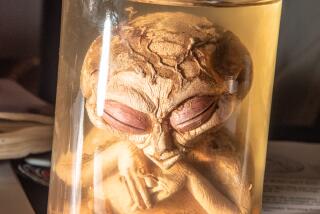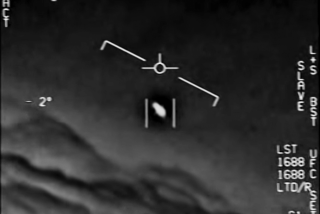A man with a dream as big as his quarry
The Center for Bigfoot Studies, like the creature itself, is not easy to find.
It hides amid the forest of homes and thickets of Christmas lights on a quiet Riverside street.
No signs or monster-size tracks point the way, but those in the know can pin it down to an upper floor of one unassuming house. There, jammed inside a few small rooms, sits one of the nation’s largest repositories of Bigfoot lore.
Rows of books, stuffed filing cabinets, sculptures and plaster casts of overgrown feet compete for space in a cluttered world dedicated to the legendary hulking primate.
Daniel Perez, 44, is curator and director of the center, which doubles as his home. It’s not typical Bigfoot habitat, but he couldn’t beat the price. And for Perez it’s the work, not the location, that matters.
“This isn’t about finding some new species of butterfly in South America which would have little impact on your life or mine,” he said. “If we ever find this, it might be the biggest scientific discovery the world has ever seen.”
Perez is no flake. He’s a serious-minded, soft-spoken electrician who let his hobby become his passion and now much of his life. He publishes the monthly Bigfoot Times, circulation 760, and has traveled the country investigating sightings and interviewing witnesses.
A recent newsletter reported a sighting from 1936 in Davistown, Pa. The 81-year-old witness told Perez she had seen an upright animal lurking around her rural home on numerous occasions when she was a girl.
“He must have been 6 feet tall, dark brown, long arms and very hairy,” she said. “Gosh, did we run across the fields into the house.”
Another article is about two men’s claims to have audio recordings of Bigfoot’s “breathing, teeth popping and growls.”
“But our conclusion was that it was nothing more than wind,” a local Bigfoot researcher wrote.
Perez is a believer but also a skeptic.
Hoaxers have tried to con him, and promising leads have unraveled. Critical evidence, such as a hefty ape-like skull allegedly found near Bishop, has had a habit of disappearing. Yet there are the stories that keep him going, the strikingly similar accounts of hairy, stinking, bipedal animals stomping through forests from Canada to California to Ohio.
Tales of ape men leading clandestine lives in the North American backwoods go back centuries. Native Americans called them Sasquatches. But the modern Bigfoot phenomenon really got its start in 1958, Perez said, when workers began finding large footprints while building a road in Oregon.
“Some guy took the story to the local newspaper, and the word ‘Bigfoot’ was born,” he said.
In 1986, Perez interviewed members of a six-man crew building a bridge 26 miles south of California’s Mt. Whitney who reported seeing a large upright creature that left 13-inch footprints in its wake.
“It scared the heebie-jeebies out of them,” said Perez, who interviewed the workers at the scene. “One guy told me it sounded like an elephant trumpeting. Another said it was a bloodcurdling scream which resembled a woman being tortured. These were serious, grown men with no reason to lie. It was my first experience with multiple sightings. I was hooked after that.”
Actually, he was hooked before that.
Perez’s pursuit of Bigfoot began at age 10 after he watched “The Legend of Boggy Creek” at a Norwalk theater. The documentary-style film dealt with a Bigfoot-like beast frightening rural Fouke, Ark.
“I thought it was just another monster movie, but it turned out to be the paving stone to who I am today,” he said. “I was curious but skeptical.”
He immediately went to the library and withdrew books about Bigfoot and other creatures, including the Loch Ness monster. He wrote letters to Bigfoot experts, who impressed him with their earnestness.
“It was almost like a science project for him,” recalled his father, Edward Perez. “It was something to keep him busy and enabled him to figure out what’s what.”
The elder Perez questions the whole thing.
“Whenever the subject is broached, I ask him, ‘Where are the bodies? Why are there no bodies?’ ”
In 1979, Perez rushed with a friend to Hemet’s Diamond Valley, chasing reports that huge footprints had been found there. He and his friend saw and measured the proof, he said. The prints were 17 inches long.
He started interviewing people who claimed to have seen Bigfoot. He dug up newspaper clippings from as far back as 1889 reporting encounters with the creature and other “wild men” of the woods. He researched Native American stories of Sasquatch, Himalayan tales of the Yeti and sightings of the Yowie in Australia.
“I understand that many people are ignorant of the data on the subject, but this is more than just tabloid stuff,” he said, picking up a cast of a large footprint. “As you can see, it’s very manlike. It walks like us and has feet like us, but it’s covered in hair and has gorilla-like features. It could be a missing link.”
Perez is writing a book about the Patterson-Gimlin film, a grainy 60-second movie purporting to show a large primate walking through Bluff Creek in Northern California. It was shot by Robert Gimlin and the late Roger Patterson.
The film, shot in 1967, still generates controversy. Believers say it’s the best evidence that Bigfoot exists. Others say it’s the best proof the whole thing is bogus. The doubters’ case was bolstered when Bob Hieronimus of Yakima, Wash., announced in 2004 that he was the film’s Bigfoot. He said Patterson offered him $1,000 to don a gorilla suit.
“Why they keep focusing on this film is beyond me,” said Robert Kiviat, producer of “World’s Greatest Hoaxes: Secrets Finally Revealed,” a Fox Network show that investigated the film.
Kiviat, who appeared with the self-proclaimed hoaxer on MSNBC’s “Countdown With Keith Olbermann” when Hieronimus made his claim, said most people laughed at the film. “It is essentially a few brief seconds of what appears to be a man walking in a gorilla suit in the woods,” he said. “But I do believe there is a mysterious animal out there. We have some hair, some DNA and some video and photographic evidence that is tantalizing.”
Perez doesn’t buy the fraud story. He says Hieronimus could never fill an 8-foot gorilla suit, and he says the suit has never been found.
He has analyzed the footage hundreds of times. He has enlarged it and slowed it down. He points out what he sees as telling details of authenticity.
“You can see the breasts on the subject. That tells us it is female,” he said. “It would seem if you wanted to fake something, you wouldn’t put breasts on it, because it would seem outlandish. You can see the buttocks and the spinal cord. Look how it walks. No human walks like that. Superficially it looks like a man, but when you look closely, it’s clearly not.”
Perez’s views are largely supported by Jeffrey Meldrum, professor of anthropology and anatomy at Idaho State University, who has studied Bigfoot for more than a decade.
“Daniel is a very skilled investigator who goes after details and ties up loose ends,” he said. “Correlating evidence is very important in this study.”
Meldrum, an expert on primate morphology, says the hoax stories don’t hold up under scrutiny.
“If you watch the film as a student of anatomy, primates and locomotion, you can see the movement of the shoulder blade under the skin,” he said. “I can see the calf muscles contract at the appropriate moments. When anyone tries to replicate it in any way, it doesn’t look like a primate.”
His theory?
“You can never be 100% sure of anything, but beyond a reasonable doubt I am convinced it portrays a real animal,” he said. “My working hypothesis is they are a species of great ape restricted to the ground but having an arboreal legacy. They would most likely be related to the orangutans.”
Meldrum said the lack of Bigfoot corpses is not a mystery given the remote spots where they are believed to live as well as the dampness of the forest and the acidic quality of forest soil, which encourages decomposition.
Upstairs in his office, Perez plays the Patterson-Gimlin film on his computer again and again.
He thinks as many as 100,000 Bigfoots could be roaming North America, but he knows he may never find even one of them.
“A lot of early researchers thought we would solve the mystery in a few years, but we haven’t,” he said. “I can’t prove Bigfoot exists, but either someone has been fabricating tracks for over a hundred years or there is a real animal out there.”
More to Read
Sign up for Essential California
The most important California stories and recommendations in your inbox every morning.
You may occasionally receive promotional content from the Los Angeles Times.










